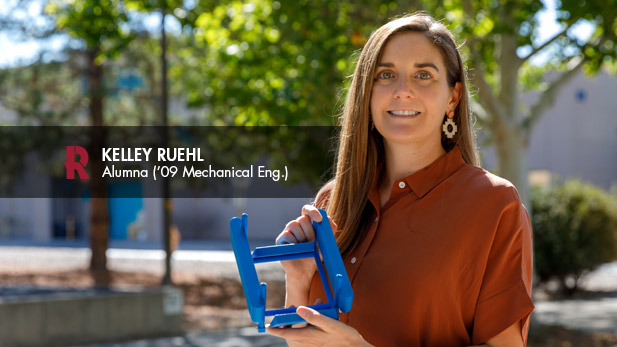Alumna Kelley Ruehl Catching the Next Wave of Energy Technology

Kelley Ruehl became interested in renewable energy at Rose-Hulman, earned a master’s degree in ocean engineering, and now is a research engineer specializing in wave energy at the Sandia National Laboratories.
The constantly moving ocean waves bring serenity to beachgoers and coastal residents and are expanding possibilities of the world’s largest theoretical power source: wave energy.
Kelley Ruehl, a 2009 mechanical engineering alumna, is striving to put theory into practice with research and development tools that are assisting in the design and construction of wave energy converters (WECs) that work efficiently, reliably, and robustly in the ocean’s dynamic environment – and complementing solar and wind as a renewable energy resource throughout the world.
Since 2011, Ruehl has been a research engineer specializing in wave energy and hydrodynamics at the Department of Energy’s Sandia National Laboratories in Albuquerque, New Mexico. She leads development of the Water Power Technologies Office’s Wave Energy Converter-Simulator (WEC-Sim) that has collaborated with the National Renewable Energy Laboratory to make open-source software readily available through an open data and information portal to simulate early-stage marine renewable energy designs using a robust modeling platform.
These numerical simulations allow for the refinement and optimization of floating concepts before deployment in the water for physical trials—whether in an expensive wave tank or an unpredictable ocean testing site – preparing for faster real-world deployment and product commercialization.
“We’re accelerating the development of wave energy and adding an abundant sustainable and renewable energy resource for a variety of applications throughout the world,” says Ruehl.
The WEC-Sim project, with its many software updates, was recognized with a R&D 100 research and development award in 2021, has been downloaded to be used throughout the world, and has contributed to several research and scholarly publications.
“The oceans are in constant motion and with the oceans making up nearly 70% of the world, there are great possibilities and opportunities with wave energy,” states Ruehl.
Protecting, understanding, and leveraging the immense power and promise of the oceans is the focus of the Water Power Technologies Office’s Powering the Blue Economy initiative. Beside harnessing the kinetic energy from waves and ocean current, the heat differential within a body of water’s thermal layers, and the difference in salt concentration within ocean waters could provide sustainable and resilient energy sources. These could support remote communities, ocean instrumentation, deep sea exploration, mining operations, and disaster relief missions, to name just a few.
Ruehl and the WEC-Sim development team are accentuating these efforts through the development, verification, validation, application, and release of the software simulation tools along with experimental testing, numerical modeling, and data analysis of other aspects of renewable energy.
“The future is happening today and we’re playing a role, whether it’s small or large, in those efforts. It’s been exciting. It has been a long time coming, but well worth the wait,” she remarks.
Ruehl became aware of the renewable energy’s possibilities during junior-year studies at Germany’s University of Stuttgart. She noticed solar and wind energy farms covering the European countryside and began wondering why the same wasn’t happening in America. Now, nearly 15 years later, it’s happening with solar and wind emerging as energy resources supplementing the U.S. power grid and powering businesses and individual homes.
“Educationally and culturally, my time studying abroad opened the world for me. I saw that there were opportunities, especially in engineering, and that I had the skills to make a worthwhile contribution to a sustainable future,” she says.
Focusing on renewable energy, Ruehl went onto earning a master’s degree in mechanical engineering, with a focus on ocean engineering, at Oregon State University. She was a graduate student intern at Sandia National Laboratories during those studies and joined Sandia full-time in 2011. Ruehl now leads a small team that’s supporting several open-source marine renewable energy software development projects, developed in Python and MATLAB, that’s enhancing the processing, visualization and managing of data.
“We want to make these tools readily accessible to others so that they can enhance the research and development process for this new form of renewable energy. We’ve done some great work and put a lot of time and effort into these software tools. Now we’re sharing that knowledge with the world,” she says. “It’s a great environment to be working in right now, and I expect our efforts will be even more important in the future.”